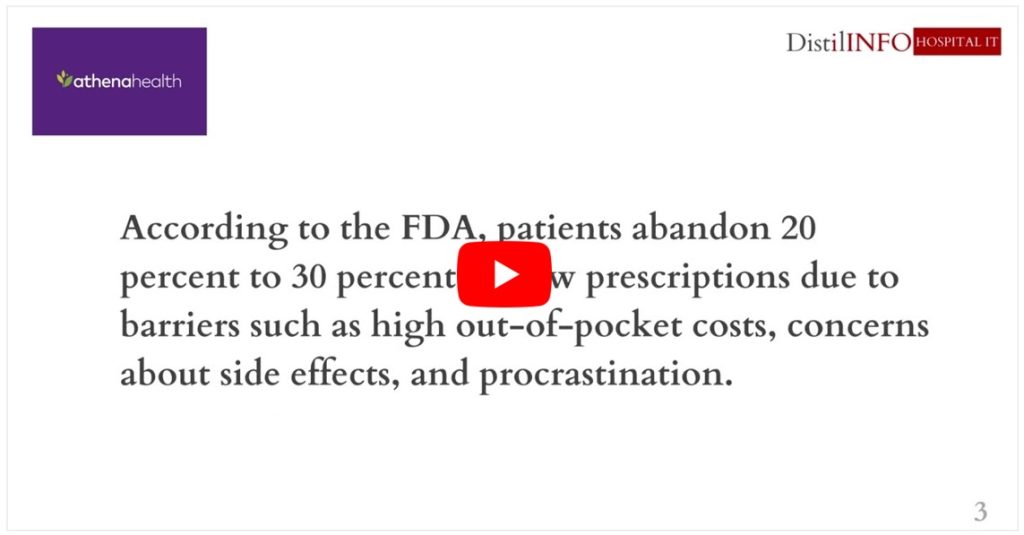
DrFirst, a health technology pioneer, and athenahealth, a leading provider of network-enabled software and services for physician groups and healthcare organizations nationwide, announced a partnership today to assist improve medication adherence and patient outcomes. To prevent prescription abandonment and assist patients to comply with their recommended pharmaceutical regimens, athenahealth’s broad user base will now be able to send patient medication notifications enabled by DrFirst’s RxInform. Patients abandon 20% to 30% of new prescriptions for a variety of reasons, including high out-of-pocket expenditures, fears about side effects, procrastination, and other issues. Medication noncompliance can result in the increased total cost of patient care as well as unfavorable health consequences such as disease progression, hospitalization, or even death. RxInform has garnered over three million patient ratings since 2017, with an overall good score of 92 percent. These findings suggest that patients enjoy these messages, opening up new avenues for clinicians to cultivate patient connections and establish loyalty outside of the exam room. “We are always looking for innovative ways to drive better results for our customers and their patients – especially as the industry shifts more toward value-based care,” said Paul Brient, chief product officer for athenahealth. “Every provider wants to minimize prescription abandonment rates because non-adherence to medication regimens negatively affects desired clinical outcomes.By adding RxInform to the latest release of athenaOne, we are immediately giving all our providers an automated function within their established prescribing workflows to support better patient outcomes.”
EHR vendor athenahealth announced it would partner with health IT vendor DrFirst to implement a secure messaging solution to improve medication adherence among patients.
Medication non-adherence is impacted by more than a complex regimen or medication management woes. Sometimes, patients never get to the pharmacy to pick up their medication. When patients abandon their prescriptions, their health is inevitably affected.

According to the FDA, patients abandon 20 percent to 30 percent of new prescriptions due to barriers such as high out-of-pocket costs, concerns about side effects, and procrastination.
This lack of medication adherence can increase healthcare costs and lead to undesirable health outcomes, such as disease progression, hospitalization, or even death.
“We are always looking for innovative ways to drive better results for our customers and their patients – especially as the industry shifts more toward value-based care,” Paul Brient, chief product officer for athenahealth, said in a press release. “Every provider wants to minimize prescription abandonment rates because non-adherence to medication regimens negatively affects desired clinical outcomes.”
“By adding RxInform to the latest release of athenaOne, we are immediately giving all our providers an automated function within their established prescribing workflows to support better patient outcomes,” Brient explained.

When a clinician sends a prescription order to a pharmacy, DrFirst’s RxInform will trigger automated text messages to provide patients with prescription details, including pick-up instructions, educational material, and savings information, the press release mentioned.
By implementing the patient engagement technology, approximately 145,000 providers that use athenahealth can support patient adherence to recommended medication therapies, athenahealth said.
In addition to patient engagement technology, price transparency can boost medication adherence.
Ensuring a patient can afford a prescription is key to medication adherence.

“We know cost is one of the big barriers to adherence,” Kevin Maben, MD, FAAP Pediatrics, a pediatrician and clinical informaticist at Presbyterian Healthcare, told EHRIntelligence in a past interview. “People either don’t fill their prescription because they can’t afford it, or they try to stretch it out and don’t take the right dose, which really impacts their outcomes and their health.”
Presbyterian Healthcare tapped real-time prescription benefit technology (RTPB) to provide patients with medication pricing during their visits.
Technology such as these empowers patients to be in charge of their own care.
By going through all the available options for prescriptions, providers can work with patients to find the medicine that’s the best fit for them. For instance, while a medication may be more expensive, it may be a patient’s preferred option because it has few side effects.
Source: EHR Intelligence




Leave a Reply